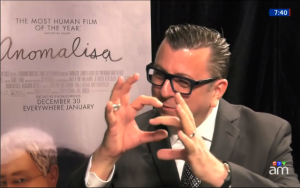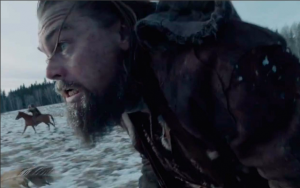Canada AM: Richard looks back on David Bowie’s life and legacy
 Richard sits in with Beverly Thomson to discuss David Bowie’s life and influence on popular culture.
Richard sits in with Beverly Thomson to discuss David Bowie’s life and influence on popular culture.
Watch the whole thing HERE!
 Richard sits in with Beverly Thomson to discuss David Bowie’s life and influence on popular culture.
Richard sits in with Beverly Thomson to discuss David Bowie’s life and influence on popular culture.
Watch the whole thing HERE!
 Here’s Richard’s “Canada AM” interview with the co-directors of the thought provoking new film “Anomalisa.”
Here’s Richard’s “Canada AM” interview with the co-directors of the thought provoking new film “Anomalisa.”
Watch the whole thing HERE!
 By Richard Crouse – Metro In Focus
By Richard Crouse – Metro In Focus
Leonardo DiCaprio makes $25 million dollars per movie. So he has money. His best friend is Tobey McGuire and his little black book reads like a Victoria’s Secret catalogue, so he’s never lonely. He has opulent homes on both the left and right coasts of America—one comes equipped with a vitamin C infused shower—and even owns a 104 acre unpopulated island off the coast of Belize.
He’s a superstar with all the creature comforts money can buy. Do you know what he doesn’t have? An Oscar.
He’s come close several times, earning nominations for his work in What’s Eating Gilbert Grape, The Aviator, Blood Diamond and The Wolf of Wall Street but he’s never entered the winner circle.
He’s always been gracious in defeat, smiling and nodding during the Oscar broadcast when someone else’s name is called. “I wasn’t surprised that Jamie got the award,” he said about the 2005 Academy Awards when Jamie Foxx took Best Actor for Ray over The Aviator. “But I knew that cameras would be stuffed up my face so I had my response ready. Anyone who says they don’t practice is a liar.”
He may not have to fake being happy for another actor this year. Pundits are predicting his new movie The Revenant could bring him that elusive honour. He plays American fur trapper Hugh Glass, a frontiersman who became a legend in 1823 when he survived a brutal bear attack and slogged across harsh terrain to get revenge on the man who left him to die.
This is DiCaprio’s Jeremiah Johnson, a movie that masks his matinee idol good looks with facial hair and grimaces. For much of the two-and-a-half-hour running time he is mute, alone on screen crawling across the frozen landscape, slowly inching his way toward vengeance. There are great physical demands made on the actor—the Bear-Maul-O-Rama being just one of the miseries he endures—but this is an internal performance. The character’s strength, pain, frustration, anger and intestinal fortitude are apparent not only in his actions—he cauterizes wounds with gun powder!—but, more importantly, in his eyes. There’s the will to survive and then there’s whatever is driving Glass and whatever that is, it’s written on DiCaprio’s face. It may not be his flashiest role—although he does get to disembowel a horse—but it is one of his best.
Nominations will be announced January 14 so we won’t know until then if he is chosen for sure, but the odds are good. So good that Vanity Fair declared, “This is going to be the year Leonardo DiCaprio finally wins that Oscar.”
Question is, why would someone who has everything want an Academy Award. What difference would it make in his life and career?
The truthful answer is that it would likely make no difference at all to his career, at least financially. He’s already in the top tier of Tinseltown salaries and the fabled “Oscar box office bump”—a sharp spike in ticket sales when the nominations are announced—hasn’t meant much in recent years.
The real win for DiCaprio would be in the prestige department. The Best Actor Oscar is a rare commodity. Only seventy-eight people have them—Daniel Day-Lewis has three, Jack Nicholson and seven others have two apiece—and while he is already a respected performer, winning one would put him in the company of Hollywood legends like Clark Gable, Spencer Tracy and Gary Cooper.
If he becomes the seventy-ninth actor to take home the gold it’s recognition from his peers but besides that, one of those statues is the perfect thing to lend some flair to the man who has everything’s private island décor.
“If you go out in the woods today. You’re sure of a big surprise.” The surprise in “Teddy Bear’s Picnic” is fairly benign—teddy bears eating and “having a lovely time”—but a new movie makes the woods out to be a much more surprising and scary place. Just as Hansel and Gretel ignored warnings about the woods and ended up coming across a cannibalistic witch, “The Forest” proves there’s nothing enchanting about this enchanted forest.
Set in the Aokigahara Forest, a real life place at the base of Japan’s Mount Fuji also known as the Suicide Forest, the movie sees Sara (“Game of Thrones’” Natalie Dormer) in search of her missing twin sister Jess (also played by Dormer). Sara recruits expat American Aiden (“Chicago Med’s” Taylor Kinney)—who, helpfully, is fluent in Japanese—and “suicide hike” guide Michi (Yukiyoshi Ozawa) to help her navigate the dense, dangerous woods. “People say spirits cannot rest there. They come back ANGRY!” Michi warns them to always stay on the path and insists they leave by sundown, but most ominously tells them, “The spirits make you see things and make you want to die!” Of course after locating Jess’s campsite just before dark Sara won’t leave and Aiden is too much of a gentleman to leave her there alone. Michi hightails it, leaving the two at the mercy of the forest’s bad mojo. Is what Sara is seeing real, or a dark fantasy caused by restless spirits?
A better name for “The Forest” would have been “Hell Hike” given the hellish amount of time we watch Sara and Aiden plodding through the woods. It’s one of those movies where you often feel like something is about to happen and then… pfffffft. It’s all anticipation and little payoff. There are a handful of jump scares—loud noises designed to give you a jolt—but they don’t add much to the story or raise many goosebumps.
Perhaps if the trio of writers (Nick Antosca, Sarah Cornwell and Ben Ketai) responsible for this skimpily plotted psychological drama spent more time on creating characters we cared about (sorry Sara and Jess) or building some actual tension we could excuse the barebones plot. The idea of the suicide forest is a good one but the movie doesn’t trust us to understand the stakes and continually—and annoyingly—reminds us that going into the forest is BAD. We get it. Now scare us.
Add to that clumsy metaphors—Jess went to the forest to battle her personal demons, now Sara is battling real ones!—and you’re left with a good justification for cinematic clearcutting.
The last time we saw Leonardo DiCaprio he was driving a Ferrari and picking up $26,000 dinner tabs. “The Wolf of Wall Street” star is back on the big screen in “The Revenant,” but now the fancy cars have been replaced with horses, the dinners with raw bison meat.
Very loosely based on real events, DiCaprio plays American fur trapper Hugh Glass, a frontiersman who became a legend when he trekked across country after a brutal bear attack. In the film it’s 1823 and Glass is scouting for a team of fur trappers. The territory is tough, the men even tougher. When Glass is mauled by a bear the company splits into two groups. The first, lead by Andrew Henry (Domhnall Gleeson) heads for home base, while the other—Glass’s son Hawk (Forrest Goodluck), hotheaded trapper John Fitzgerald (Tom Hardy) and the inexperienced Jim Bridger (Will Poulter)—is paid handsomely to stay with Glass, and provide a decent burial when he succumbs to his injuries. Fitzgerald, more interested in getting paid than waiting for Glass to die, hurries the process along, stabbing Hawk and throwing the half dead scout into a hastily dug hole. When Glass comes to he has just one thing on his mind—revenge. “I ain’t afraid to die no more,” he says. “I done it already.”
This is Leo’s “Jeremiah Johnson,” a movie that masks his matinee idol good looks with facial hair and grimaces. His journey is at the heart of the movie but he shares the weight of carrying the film with Hardy. For much of the two-and-a-half-hour running time DiCaprio is mute, alone on screen crawling across the frozen landscape, slowly making his way toward Fitzgerald and his proposed revenge. There are great physical demands made on the actor—the Bear-Maul-O-Rama being just one of the miseries he endures—but this is an internal performance. The character’s strength, pain, frustration, anger and intestinal fortitude are apparent not only in his actions—he cauterizes wounds with gun powder!—but, more importantly, in his eyes. There’s the will to survive and then there’s whatever is driving Glass and whatever that is, it’s written on DiCaprio’s face. It may not be his flashiest role—although he does get to disembowel a horse—but it is one of his best.
Hardy’s Fitzgerald is painted in broader strokes. Driven by greed, this guy makes Bane look as morally bankrupt as Mary Poppins. Intimidating and ruthless, Hardy is a force of nature equal to anything Mother Nature places in Glass’s way.
Perhaps the “The Revenant’s” most complex character is Will Poulter’s Jim Bridger. He’s the runt of the litter, the youngest member of the expedition. Torn between loyalty to Hawk and Glass, his responsibility to his employers and his moral obligations, he is trapped in an impossible situation. Poulter pulls it off with a mix of steely determination and vulnerability.
“The Revenant” is the cinema of misery on screen and off. I’d suggest theatre-goers wear a sweater because the sense of cold and discomfort experienced by Glass is palpable.
On screen the primal story of revenge spares nothing to illustrate the hardships faced by all involved but director Alejandro González Iñárritu hasn’t simply made a gruesome film for the sake of upsetting the audience. Instead, it’s a movie that ends in a question mark. Is Glass’s payback justified or a hollow mission? Iñárritu leaves that decision to the audience, and it is sure to spark conversation as the closing credits roll.
Charlie Kaufman, the pen behind behind “Being John Malkovich,” “Eternal Sunshine Of The Spotless Mind” and “Adaptation,” is back, this time as director, with a new film that uses puppets animation to delve deep into some very human feelings.
Michael Stone (the voice of David Thewlis) is an unhappy, dissatisfied man. The author of customer management manuals, he spouts helpful advice about how to keep clients happy, but has not mastered the art of finding happiness in his own life. At a speaking engagement in Cincinnati—he’s reading from his book “How May I Help You Help Them?”—he is confronted by an old love and has an intense fling with a stranger, Lisa (Jennifer Jason Leigh), an Akron, Ohio customer service rep with low self esteem (but a way with a song) in town to hear Stone speak. Cue the most intense marionette sex scene you’re likely to ever witness on the big screen.
“Anomalisa” uses a very artificial method to poke and probe into Stone’s very real mid-life crisis. The puppets pack an unexpected emotional weight as they bare their imperfections, both personal and physical, in what amounts to a long dark night of the soul for both Michael and Lisa. A palpable sense of longing and loneliness coupled with the nagging promise of hope keep “Anomalisa” from being a gimmicky—why tell the story in stop motion?—exercise in storytelling, elevating it to a thoughtful, poignant (and occasionally very funny) study of misery in modern life.